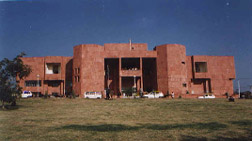
Jammu & Kashmir High Court
The full-fledged High Court of Judicature for the Jammu and Kashmir State was established in the year 1928. Prior to the establishment of High Court of Judicature. The Ruler of the State (Maharaja) was the final authority in the administration of justice. In the year 1889, the British Government asked the then Ruler of the State, Maharaja Partap Singh to appoint a Council and the Judicial member of the Council exercised all the appellate powers both on civil and criminal side. The State having two provinces Jammu and Kashmir, had chief judges exercising judicial authority but they acted under the superintendence and control of the Law member of the Council. Later the Council was abolished and a Minister designated as Judge of the High Court was appointed by the Ruler to decide judicial cases. In 1927 a new Constitution was sanctioned by the then Ruler of the State and instead of Law Member, a Ministry in the Judicial Department was created. Thereafter, in 1928, by virtue of Order No. 1 dated 26.3.1928, the High Court of Judicature was established and for the first time the High Court was to consist of The Chief Justice and two Judges. On 26.3.1928, the Maharaja appointed Lala Kanwar Sein as the First Chief Justice of the Court and Rai Bahadur Lala Bodh Raj Sawhney and Khan Sahib Aga Syed Hussain as Puisne Judges. The usual places of sitting of the High Court uses to be Jammu and Srinagar. In 1939 the Ruler promulgated the Constitution Act of 1996 which incorporated the provisions of law relating to the High Court and conferred upon the High Court a substantial measure of Independence. The High Court was invested with powers of superintendence and control over the Courts / District judiciary. The 1996 (1939 A.D.) Act also constituted a 3 members Board of Judicial Advisers akin to the Privy Council in British India. The Board was to advise the Ruler in the disposal of the civil and criminal appeals against the decisions of the High Court. The Board of Judicial Advisers at the time of its abolition by the Constitution Act 1956 had 17 appeals pending before it. On request of the Chief Justice, the Government of India in consultation with the Chief Justice of India, constituted a Special Bench of the Supreme Court of India consisting of Justice Mehar Chand Mahajan, chief Justice of India, Justice S.R.Das and Justice Ghulam Hassan for disposing off the pending 17 appeals. The Bench heard the appeals in Srinagar and upheld the judgement of the High court in all the 17 appeals. It was a historical event, when a Bench of Supreme Court held sitting outside the place of seat at Delhi till date this is the sole instance. On 10.9.1943, Letters Patent was conferred on the High Court. In 1954 vide Constitution Application Order of 1954, the jurisdiction of the Supreme Court was extended to the State of J&K. Under Art.32(2-A) of the Constitution of India, the State High Court was for the first time given power to issue writs for enforcement of the fundamental rights so far as they are applicable to the State of J&K. In 1957, by the Jammu and Kashmir Constitution Act, an independent judicial body with the High Court of Judicature at the top was created. The High Court has at present a sanctioned strength of 17 Judges including 13 Permanent Judges and 4 Additional Judges. From May to end October, The Chief Justice and the Administrative Wing of High Court shifts to Srinagar and from November to end April, the HQ is at Jammu. However, Court sections of both the Jammu and Srinagar Wings of the High Court function throughout the year.

Jammu & Kashmir High Court: Established on 14 May 1954
First Chief Justice: Hon'ble Justice Lala Kanwar Sein
State: Jammu and Kashmir